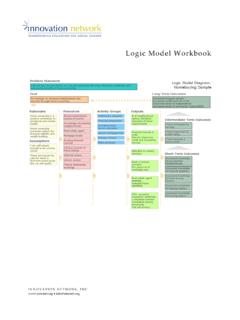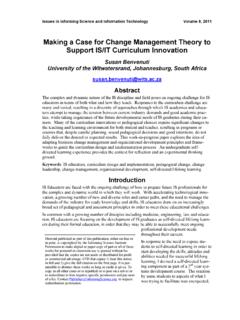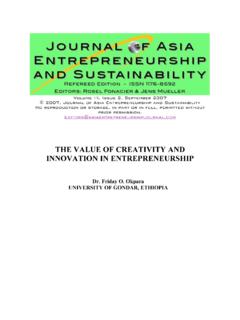Transcription of Are Robots Taking Our Jobs, Or Making Them?
1 PAGE 1 Are Robots Taking Our jobs , or Making Them? BY BEN MILLER AND ROBERT D. ATKINSON | SEPTEMBER 2013 THE INFORMATION TECHNOLOGY & innovation FOUNDATION | SEPTEMBER 2013 INTRODUCTION With unemployment remaining stubbornly above seven percent and job growth anemic, many have latched on to a compelling explanation: the Robots are Taking our jobs . In other words, a neo-Luddite narrative has taken hold. According to this line of thinking, high productivity driven by increasingly powerful IT-enabled machines is the cause of labor market problems, and accelerating technological change will only make those problems worse. There s only one flaw in this narrative: it is completely wrong and not supported by data, scholarly evidence or logic.
2 This report analyzes the Robots are killing our jobs arguments, shows how they are constructed on faulty analysis, examines the extensive economic literature on the relationship between employment and productivity, and explains the logic of how higher productivity leads to more jobs . We show that more technology benefits not just the economy overall, but also workers: more and better technology is essential to competitiveness and higher living standards. The claim that increased productivity eliminates jobs is misguided speculation. These neo-Luddites make a rough and fallacious correlation between today s high unemployment and the cool technology they see all around them ( , their smart phones, the kiosks at airports, Watson on Jeopardy).
3 Clearly, in their minds, there must be a connection. For them, technology is enabling the same amount of work to be done with fewer people and doesn t lead to a dynamic where these people become reemployed doing other work. In other words, they believe that the jobs are gone and the workers are added to the unemployment rolls. The view that machines are a problem saps the American spirit of its relentless and aggressive support for innovation and progress. It is time to consign neo-Ludditism and its particular refrain that technology costs jobs once and for all to the dustbin of history. PAGE 2 THE INFORMATION TECHNOLOGY & innovation FOUNDATION | SEPTEMBER 2013 This is what economists call the Lump of Labor fallacy, the idea that there is a limited amount of labor to be done.
4 The implication is that technology can create unemployment by displacing workers, because the more efficiently we work (using machines or otherwise), the less work there is for workers to do. As we discuss below, this is a false reading of the process of technological change because it doesn t include critical second order effects whereby the savings from increased productivity are recycled back into the economy to create the demand that in turn creates jobs . Even many of those who acknowledge that new jobs will be created worry that there will not be enough of them to replace the lost ones, even in the long run. They warn that a time will come, sooner than we think, when even new jobs will be better done by machines, and unemployment will skyrocket.
5 For them, our consumption demand may be unlimited, but in practice it is dependent on the rate of change of technology and automation. There are jobs being created and destroyed in the economy all the time, but what happens if technology increases the rate of job destruction? How do we know that humans will always be better at some work or more importantly, enough work than machines? One reason is that our economy is complex, with a broad range of industries and occupations, some amenable at a particular time to automation, most others that are not. Another is that technological change, no matter how advanced, does not happen overnight and current productivity increases are actually trending down.
6 But the main reason is that human wants are close to infinite we need look no further than the fact that most people would love to win the Powerball lottery. And as long as that is true, those wants will require labor to fill them (even if that labor is eventually supplemented by 22nd century Robots ). We can also look to history: in many ways these arguments are not new. Over the last century whenever unemployment rates have risen there have always been some who blame the machines. Some even argued we were heading toward mass permanent unemployment. But what is different today is how widespread the neo-Luddite view has become and how well-received it is in Western society.
7 (When the leading proponents of this view get an amiable hearing on the TV show 60 Minutes, you know that something has changed.)1 This is what is different and most troubling. In the past, neo-Luddite anti-progress views were episodic, emerging occasionally when joblessness spiked but then receding into the background, and they were always going against the grain of the uniquely American faith in the desirability and inevitability of progress. Today that faith is waning, which points to the real threat that neo-Ludditism presents: the view that machines are a problem and not the solution saps the American spirit of its relentless and aggressive support for innovation and progress.
8 It is time to consign neo-Ludditism and its particular refrain that technology costs jobs once and for all to the dustbin of history. Robots , automation, machines, productivity: these are key enablers of human progress and absolutely no threat to overall employment. As such, economic policy should at every possible opportunity not give in to neo-Luddite exhortations, but instead put the pedal to the metal for higher productivity and more machines. PAGE 3 THE INFORMATION TECHNOLOGY & innovation FOUNDATION | SEPTEMBER 2013 THE RISE OF THE NEW LUDDITISM Many define the term Luddite as someone who resists adopting new technology. In fact, the term refers to a person who actively opposes technology and wants to literally or figuratively smash the machine.
9 It has its origins in English industrial history when Englishman Ned Ludd encouraged his followers to destroy textile machines at the beginning of the Industrial Revolution, for the machines were enabling more textile production with fewer workers. Ludd and his followers couldn t stop progress, but they could and did slow it down. Figure 1: Newspaper illustration of British weavers destroying textile machines in the early nineteenth century (Unknown illustrator [c. 1840s]. Courtesy of Wikimedia Commons.)2 There has long been a small number of anti-technology zealots Making the case that technology is hurting jobs . To wit, Jeremy Rifkin s 1995 book, The End of Work, laments that [technological change] is now leading to unprecedented levels of technological unemployment.
10 3 But in the last few years these few divergent voices have been joined by a broad chorus of more mainstream voices claiming that technological change (referred to interchangeably with innovation , automation, and increasing productivity ) is leading to fewer jobs . Many economists, journalists, and policymakers now routinely claim that technology, instead of being a key driver of increased standards of living, is to blame for our economic doldrums. In the last few years there has been an outpouring of books, articles, op-eds, and blogs warning that it is technology that is behind today s high unemployment rates and that the destructive effect of technology on jobs will only increase going forward.









